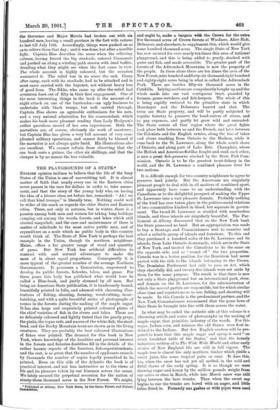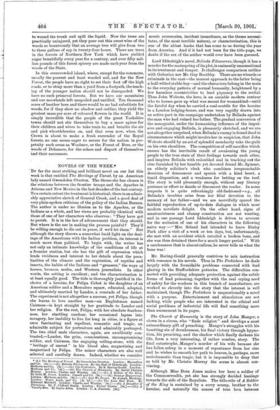THE PLAYGROUNDS OF A STATE.*
ENGLISH opinion inclines to believe that the life of the' busy States of the Union is one of unremitting toil. It is almost matter of faith that nearly every one in the Eastern cities never pauses in the race for dollars in order to take amuse- ment, and that the story of the young lady who, on having the idea of a leisure class set before her, remarked : " Ah we call that kind tramps," is literally true. Nothing could well be wider of the mark as regards the older States and Eastern cities. There, not only in autumn, but in winter, there is a passion among both men and women for taking long holidays camping out among the woods, forests, and lakes which still abound unspoiled; and the care and maintenance of these is matter of solicitude to the most active public men, and of expenditure on a scale which no public body in this country would think of. The State of New York is perhaps the best example in the Union, though its northern neighbour, Maine, offers a far greater range of wood and quantity of game. But New York has artificial difficulties to contend with and natural advantages to make the most of in about equal proportions. Consequently it is more typical of the greater number of the average Northern Governments. It pcssesses a Commission, empowered to develop its public forests, fisheries, lakes, and game. For three years this body has published what would here be called a Blue-book, and justly shunned by all men. But being an American State publication, it is handsomely bound, beautifully printed in folio, and adorned with charming illus- trations of fishing, shooting, farming, wood-cutting, trout- hatching, and with a quite beautiful series of photographs of scenes in the forests during the making of the maple sugar. It has also large and exquisitely printed coloured plates of the chief varieties of fish in the rivers and lakes These are so delicately coloured and lightly tinted that the pearly greys, the pinks, the topaz reds, and nacres of the white-fish, the steel- head, and the Rocky Mountain trout are shown as in the living creatures. They are probably the best coloured illustrations of fishes ever printed. The demand for this book in New York, where knowledge of the localities and personal interest In the forests and fisheries doubtless fill in the details of the rather laconic reports of the foresters, fish-superintendents, and the rest, is so great that the number of applicants exceeds by thousands the number of copies legally permitted to be printed. Even on this side of the Atlantic the book is of practical interest, and not less instructive as to the views of life and its pleasure taken by our kinsmen across the ocean. We lately secured the perpetual reversion for the nation of ninety-three thousand acres in the New Forest. We might,
_ • Published at Albany, New York State, by the Game, Forest, and Fishery uenissiesien.
and ought to, make a bargain with the Crown for the extra five thousand acres of Crown forests at Woolmer, Alice Holt, Delamere, and elsewhere, to supplement this, which would give some hundred thousand acres. The single State of New York has now secured for ever nearly ten times this area of national playground, and this is being added to yearly, stocked with game and fish, and made accessible. The greater part of the forests of the Adirondack Mountains is now the property of the people. In these alone there are ten times the area of the New Forest, nine hundred andforty-six thousand eight hundred and eighty-eight acres being in what is called the Adirondack Park. There are besides fifty-six thousand acres in the Catskills. Inlying sections are compulsorily bought up and the whole made into one vast contiguous tract, guarded by firemen, game-watchers, and fish-keepers. The whole of this is being rapidly restored to the primitive state in which Deerslayer and the Delawares hunted and shot. The trees are State property, and will be partly subjected to regular forestry to preserve the head-waters of rivers, and to pay expenses, and partly let grow wild and untended. The State covers all that region where the great fights took place both between us and the French, and later between the Colonists and the English armies, along the line of lakes and rivers reaching from Ontario to the Hudson, while it runs back to the St. Lawrence, along the whole south shore of Ontario, and along part of Lake Erie. Champlain, where the British and American flotillas fought and sunk each other, is now a great fish-preserve stocked by the State Fish Com- mission. Ontario is to be the greatest trout-fishery in the world, and the St. Lawrence a combined pleasure river for two nations.
It is difficult enough for two country neighbours to agree to preserve land jointly. But the Americans are singularly pleasant people to deal with in all matters of combined sport, and apparently have come to an understanding with the Canadians as to the delightful prospect of making the Upper St. Lawrence into a vast pleasure domain. Probably nothing of the kind has ever taken place in the politico-social relations of two communities kindred in blood, but separate in govern- ment. The broad St. Lawrence is studded with numberless islands, and these islands are singularly beautiful. The Par- liament at Albany discovered that on the New York bank the State possessed no land. But an appropriation was made to buy a frontage, and Commissioners sent to examine and select a suitable group of islands and foreshore. To this end they purchased a hundred miles of the St. Lawrence and its islands, from Lake Ontario downwards, which are in the State of New York, and invited the Canadians to do the same on the opposite side, and so "round off" the two properties. Canada was in a better position, for the Dominion had never parted with the title to the islands belonging to the Crown. The Dominion Parliament had only to pass an Act, which they cheerfully did, and twenty-five islands were set aside by them for the same purpose. The result is that there is now not only a State playground but an international park, river, and domain on the St. Lawrence, for the administration of which the several parties are responsible, but for which similar close time and regulations as to use, fishing, and shooting will be made. In this Canada is the predominant partner, and the New York Commissioners recommend that the game laws of their State be brought into line with those across the water.
In what may be called the aesthetic side of this volume is a charming article and series of photographs on the making of maple sugar, that primitive industry of the woods. For this sugar, Indian corn, and tobacco the old States were first in- debted to the Indians. But few English readers will be pre- pared to learn that this maple sugar and syrup is used "on every breakfast table of the States," and that the homely industries written of in The Wide Wide World and other early stories of New England life are still in full vigour. The maple tree is almost the only northern timber which yields a sweet juice, like some tropical palm or cane. It does this, too, when the snow has not yet all melted, in the cold and fitful thaws of the early spring. It is as though we were drawing sugar and honey by the million pounds weight from our ashes or elms in March, while late March snow was still lying between the bare trunks. Then when the sweet sap begins to rise the trunks are bored with an auger, and little tubes fitted in. Formerly axe gashes or wide pipes were used
to wound the trunk and spill the liquid. - Now the trees are practically uninjured, yet they pour out this sweet wine of the woods so bounteously that an average tree will give from two to three gallons of sap in twenty-four hours. There are trees in the forests of Northern New York which have yielded sugar bountifully every year for a century, and over fifty mil- lion pounds of this forest spicery are made each year from the woods of the State.
In this overcrowded island, where, except for the commons, usually the poorest and least wooded soil, and for the New Forest, the people have no right to set their foot off the high• roads, or to stray more than a yard from a footpath, the teach- ing of the younger nation should not be disregarded. We have no such primeval forests. But we have our mountains and our moorlands left unspoiled and unfilled. Ten thousand acres of heather here and there would be no bad substitute for woods, for if they show no shadow and outline, they yield the greatest mass per acre of coloured flowers in the world. It is simply incredible that the people of the great Yorkshire towns should not stir themselves to buy a moor apiece for their children and wives to take train to, and breathe the air and pick whortleberries on, and that even now, when the Crown is about to make a fresh surrender of the Royal forests, no one seems eager to secure for the nation in per- petuity such areas as Woolmer, or the Forest of Bare, or the woods of Delamere, for the solace and disport of themselves and their successors.







































 Previous page
Previous page